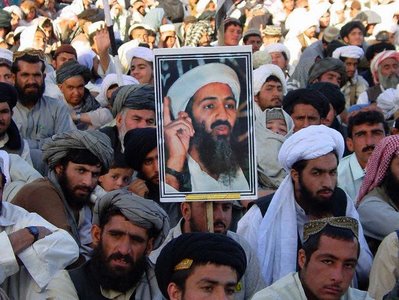We're all doomed part 94.
 Even the Grauniad on occasion likes to try and scare its readers: what other reason for plastering "Al-Qaida has revived, spread and is capable of a spectacular" in a font bigger than the masthead across its front page?
Even the Grauniad on occasion likes to try and scare its readers: what other reason for plastering "Al-Qaida has revived, spread and is capable of a spectacular" in a font bigger than the masthead across its front page?The alarm bells ought to start ringing when the article notes, around 300 words in, that the International Institute for Strategic Studies's director of transnational threats and political risk is one Nigel Inkster, a former spook who was in the frame for becoming the head of MI6 three years ago before he left. Unsurprisingly then, he goes further than the report itself in stating without hesitation that "al-Qaida" is stronger than it was prior to 9/11 and capable of carrying out a similarly spectacular attack.
The proof behind this? Very little. Apparently, the mere fact that a planned attack was foiled last week in Germany involving vast amounts of hydrogen peroxide, and that last summer's "liquid bombs" plot was similarly stopped shows that al-Qaida still has the ambition to carry out spectaculars. We shouldn't let the facts get in the way of the IISS's certainty: that the group allegedly behind the German plot was the "Islamic Jihad Union", a group meant to have split from the Islamic Movement of Uzbekistan, although Craig Murray relates that he was never able to find any proof that the IJU had even existed. It's quite true that IMU has found something of a safe haven in Waziristan, the same Pakistani tribal area where the Taliban have been regrouping and where it's most likely that the real al-Qaida itself is slowly regenerating, but this plot involved two home-grown Germans, rather than all involving foreigners. As for the liquid bombs plot, we're no nearer to discovering whether the attacks were even viable, let alone whether those arrested have established links to al-Qaida.
Where the report does it get it right is in suggesting that al-Qaida's ideology is taking root: this is sadly the case, and most certainly 9/11's real legacy. The threat it also likely to get worse before it does get better: that threat however does not necessarily come from al-Qaida itself, but through those highly influenced by the same takfirist ideology who take matters into their own hands. It also places too much emphasis on the fact that the al-Qaida brand is taking off across the world: that the GSPC has changed its name matters not one jot, except to Algerians themselves. The real danger remains that when the US does finally withdraw from Iraq, we're going to have a lot of redundant mujahideen much more globalised in their thinking than they were either at the end of Soviet invasion of Afghanistan or from Bosnia. Some are likely to join other struggles wherever they are then, but others are also going to turn their attention to the West. Such experienced fighters are always going to be far more dangerous than the idiots who try to blow up airports with patio gas canisters, petrol and matches.
What the report doesn't say is that we are ourselves are getting far better, both at tackling radicalisation and at spotting the dangers themselves. The defection by Maajid Nawaz, formerly of Hizb-ut-Tahrir to arguing against the politicisation of Islam as practiced by the group is incredibly welcome, especially as unlike Ed Husain he isn't calling for its banning and recognises that most of those within it are actually just typically young: angry and alienated rather than potential terrorists. Someone with his authority tackling the message of such groups, and doing so theologically rather than just rhetorically is the biggest threat which those who prosper on ignorance and one interpretation face, far beyond anything that the government's policies on cohesion can produce.
As Jason Burke also identifies, the report also mentions how climate change has the potential to have an effect similar to nuclear war, far beyond anything that any terrorist group can ever achieve. Putting too much stock in immediate rather than gradual doom may have been around for centuries, but it's still no less virulent today.
Labels: al-Qaida, Grauniad bollocks, Maajid Nawaz, radicalisation, scaremongering, terror
"Where the report does it get it right is in suggesting that al-Qaida's ideology is taking root: this is sadly the case, and most certainly 9/11's real legacy."
Nit-picking slightly but I'd alter that a little. Immediately after the attacks, there was a huge groundswell of sympathy and support for the American people, including among very many Muslims. There was a real possibility that it could have led to a significant decline in support for al-Qaida.
Instead, the Bush administration's response to the attacks pissed away that opportunity and did so much to bolster support for al-Qaida's ideology.
Posted by Garry |
Friday, September 14, 2007 1:45:00 pm
Garry |
Friday, September 14, 2007 1:45:00 pm
True, although I also think it awakened those already inured with the belief of being victims of the West (quite understandably, in some cases) to a possible solution, and also a globally, fully fleshed out alternative to American hegemony. The numbers may be far, far fewer, but still significant.
Posted by septicisle |
Friday, September 14, 2007 2:55:00 pm
septicisle |
Friday, September 14, 2007 2:55:00 pm
Post a Comment